DePaul’s newest school of study is marked by its unique approach to diplomacy, ground-up creation and the opportunities provided by its anonymous donors
On Tuesday, DePaul President A. Gabriel Esteban announced the creation of the new Grace School of Applied Diplomacy, made possible by an anonymous $20 million gift to the university.
The Grace School has the particular aim to teach students how to apply diplomatic skills and knowledge both in the traditional sense of foreign service and in other fields, such as the private sector and local politics. The school was created over a two-year process involving faculty from 23 existing fields of study within the university. The school will be situated within the College of Liberal Arts & Social Sciences (LAS).
During Tuesday’s ceremony, Esteban addressed the anonymous gift and creation of The Grace School with a quote from St. Vincent de Paul: “Noise makes no good, good makes no noise.”
The two hour ceremony included several speakers, an interreligious blessing, two keynote addresses and a five-person panel discussion.
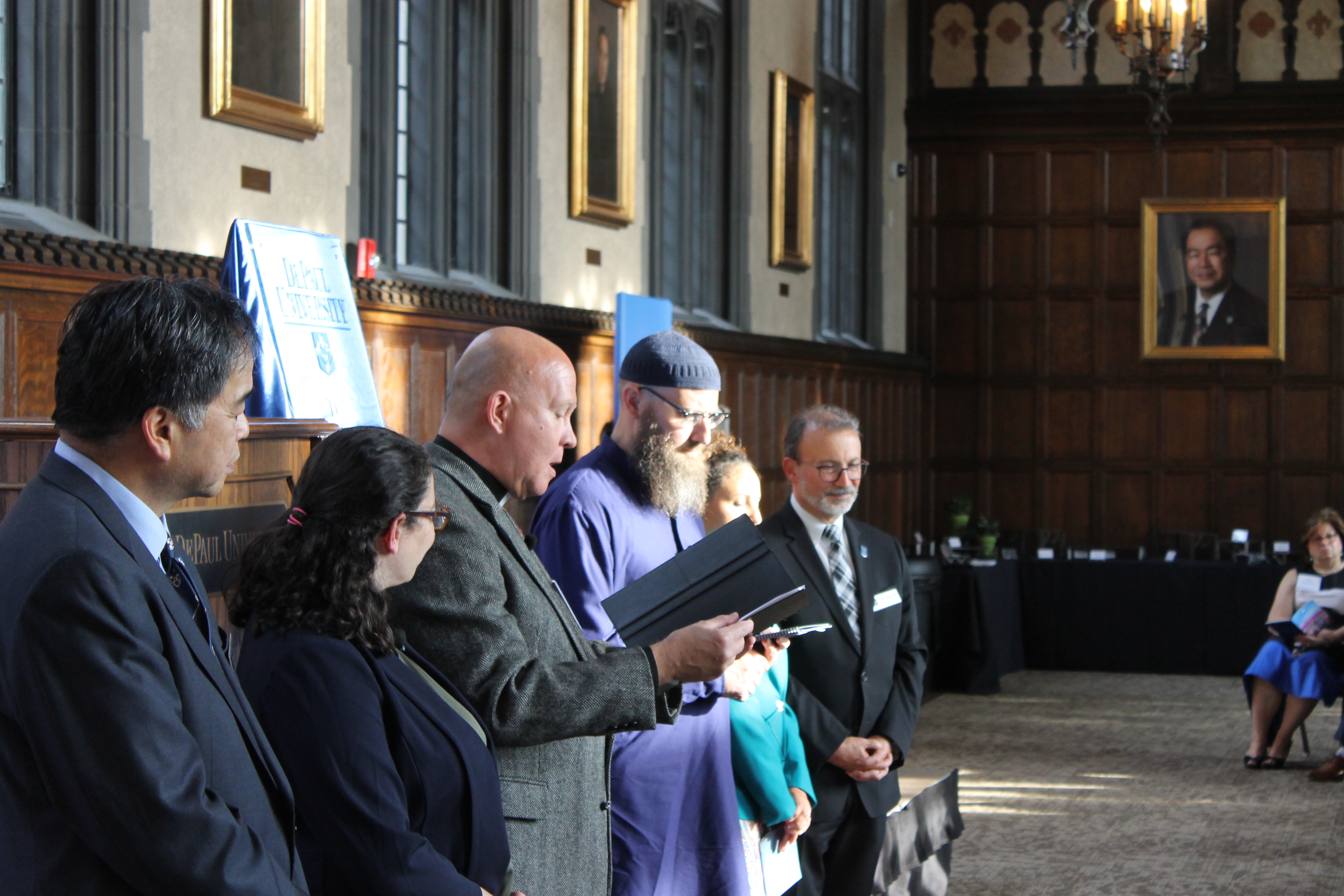
President Esteban watches as Father Christopher Robinson and other religious speakers give a blessing to The Grace School. Photo by Christopher Silber, 14 East.
It began with speeches by Esteban, Dean of LAS Guillermo Vásquez de Velasco and the inaugural director of The Grace School, Dr. David Wellman.
Before taking this new position, Wellman had been an associate professor of religious studies since 2009 and has taught at DePaul since 2005. His research, including the book Sustainable Diplomacy: Ecology, Religion and Ethics in Muslim-Christian Relations, merges the study of religion and diplomacy.
The faculty were followed by a keynote address by Etharin Cousin of the Chicago Council of Global Affairs.
A new approach to teaching diplomacy
Velasco said the school was formulated out of DePaul’s Vincentian mission, and particularly the Vincentian question, “What must be done?”
“We thought it needed to be a kind of diplomacy where application is key, and that kind of application can only be accomplished in a multidisciplinary, trans-professional environment,” Velasco said. “That was the driver of the creative process of coming up with the curriculum.”
By its multidisciplinary nature, many of the core courses for a bachelor’s in applied diplomacy are already taught at DePaul, and include classes in geography, international studies and political science. Velasco said that this quarter more than 120 classes in the university can contribute to the school’s curriculum, including five of the seven required courses.
Dr. Valerie Johnson, chair of the political science department and a member of The Grace School advisory board, said some courses she teaches will be in the curriculum and that the new school will stand out from other diplomacy programs.
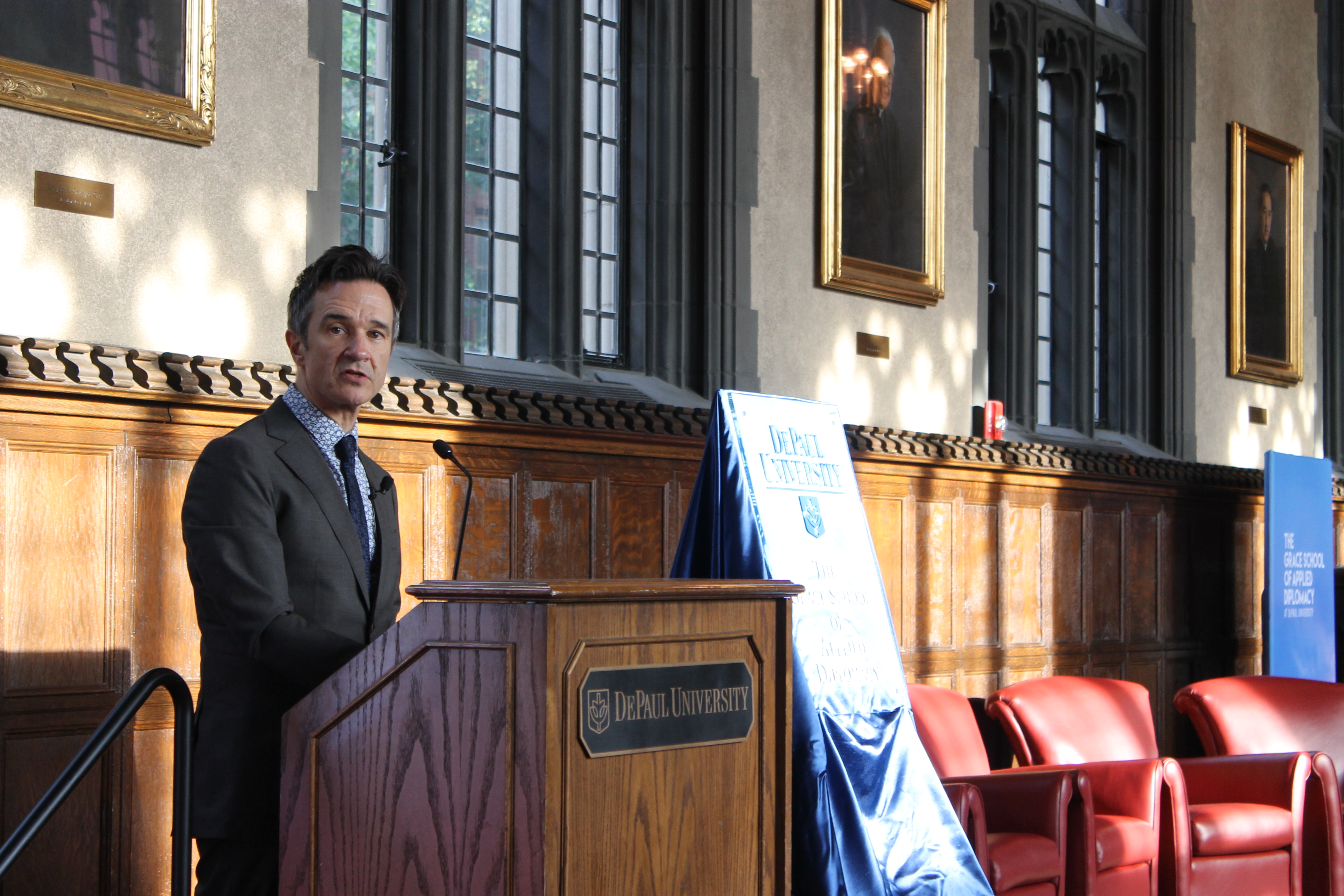
Dr. David Wellman speaks at the opening of the ceremony. Photo by Christopher Silber, 14 East.
“This is a new twist on diplomacy. Most of the time when people think of diplomacy they think of international diplomacy, but this is applied diplomacy from the ground up. This is a way of infusing diplomacy into all walks of life,” Johnson said.
The key difference between traditional “diplomacy” and “applied diplomacy” involves the fields in which a person uses diplomatic skills. Most diplomacy schools teach diplomacy as it relates to foreign service and international relations. The unique educational goal of The Grace School is to teach students to apply diplomacy skills such as mediation and conflict resolution in a variety of professions locally and abroad.
“The interdisciplinary curriculum of The Grace School is designed to not only prepare students for work in the diplomatic corps, but also for applying the tools of diplomacy to careers in the private sector, the sciences, community service, the arts, religious leadership, and in the work of community organizing and activism,” Valesco said.
The bachelor’s program will have a staggering ten concentrations and the master’s program will have six concentrations. Undergraduates will also have a six course modern language requirement, and master’s students will need proficiency in a second language to graduate. While the curriculum has been laid out and is available to view online, some unknowns still exist about the department, including where the administrative offices will be.
“As you can imagine, a school that is born out of more than twenty different academic units pretty much is everywhere,” Valesco said. “The admin office will be here in Lincoln Park, where most of those courses are being offered, and the [school’s plaque] will be established in that location yet to be announced.”
The gift and its stipulations
On the specifics of the gift, the university released this statement:
“While we are unable to discuss specific dollar figures, The Grace School will use the $20 million gift in a variety of ways to support students and faculty. These include: An endowed chair; seven endowed professorships, three of which will be filled with scholars whose research focuses on the areas of interreligious engagement, environmental sustainability and urban studies; experiential learning opportunities such as internships, study abroad or U.S. regional study away; connecting faculty and students with professional and citizen diplomats; developing a program supporting practitioners in residence; and creating The Grace School International Student Fund, which will bolster international student recruitment and expand access to a liberal arts education to students from underrepresented countries.”
As for who funded the gift, the only information available is that it had multiple donors.
“All I can tell you about the donors is that they’re extremely generous and we’re extremely grateful to them, but we’re not allowed to talk about them more than that. We have to honor their wishes,” Wellman said.
Nationally, large donations to universities have come under scrutiny due to a highly publicized bribery scandal in which schools were bribed to accept children of the rich and famous. DePaul made headlines in March as it was discovered William Singer, the man allegedly behind the scandal, legally donated $150,000 to DePaul while his son attended the university. His donations to DePaul were not connected to the bribery case but raised a few eyebrows in the community.
Valesco said the gift was thoroughly vetted and was made purely to enhance the educational opportunities at DePaul.
“Of course, the university is very careful in vetting all the gifts that come in. We take that very seriously. In this case it is given to provide enhancement on the learning experience,” Valesco said.
Another initially perplexing piece of information about the school involves its name. Wellman did not attribute the “Grace” in Grace School for Applied Diplomacy to any person, but rather the term “grace.”
When asked about the name, Wellman said, “I think that grace is really when you receive something that you couldn’t have possibly earned on your own, so when I think about the group of people, the extraordinary gift, it is a game changing time now for all of us, so I think it’s a situation that’s full of grace.”
Speakers discuss the future of diplomacy and DePaul’s place in it
Tuesday’s ceremony brought together people from backgrounds in religious practice, local activism and international diplomacy to discuss The Grace School.
The inter-religious blessing featured Rabbi Megan GoldMarche of Metro Chicago Hillel, Father Christopher Robinson of the Congregation of the Mission, DePaul’s Muslim Chaplain Imam Abdul-Malik Ryan and Director of Organic Oneness Syda Segovia Taylor. Each person gave a brief speech and blessing.

Etharin Cousin speaks in front of the panel at the ceremony. Photo by Christopher Silber, 14 East.
Etharin Cousin set the tone for the panel with a passionate opening keynote address. Cousin is the former executive director of the United Nations World Food Programme and currently works at the Chicago Council on global affairs. She was ranked the 48th most powerful woman in the world by Forbes in 2016.
Cousin discussed using unorthodox methods including a social media campaign to engage in international diplomacy to provide food for people in Syria in 2014. She said she was seen in a negative light by diplomats and donor governments from other countries for breaking protocol.
An excerpt form Cousin’s speech:
Cousin said that non-traditional actors have begun to enter the field of traditional state-led international diplomacy, and that this is a good development.
“This pluralisation of diplomatic actors should be seen in positive terms, rather than, as some have suggested, a de-professionalisation of diplomacy,” Cousin said.
She closed by saying,“We have only scratched the surface of the power and possibilities of trained citizen engagement and what it might unleash. Imagine the possibilities.”
Following Cousin’s address, a five person panel took questions from Dr. Wellman.
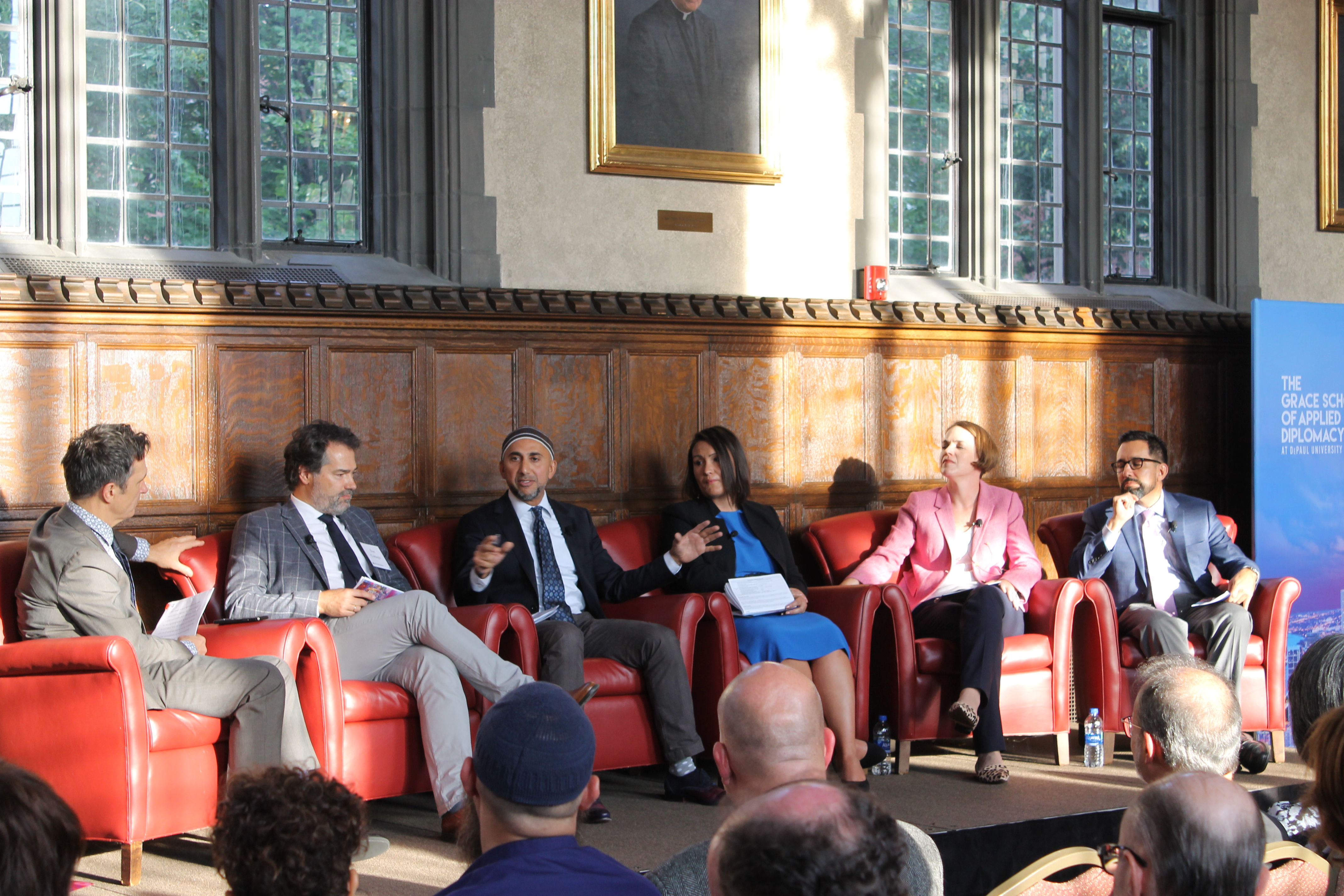
Rami Nashibi speaks to the crowd during the panel discussion. Photo by Christopher Silber, 14 East.
The five panel members were:
- Kasia Batorski, Senior Director at NAFSA: Association of International Educators
- Dr. Noé Cornago, associate professor of international relations at the University of the Basque country
- Rami Nashibi, Executive Director of the Inner-City Muslim Action Netwok
- Caroline Savage, Director of the U.S. Department of State Foreign Press Center
- Dr. Chris Tirres, associate professor of religious studies at DePaul University
The panel members each drew on their own experiences to discuss applications of diplomacy as a whole. Batorski, who has worked in the public and private sectors, reflected on the similar skill set needed in both sectors, despite their contentions and differences.
“They all need to build bridges and solve conflict to create common ground, draw on a global mindset, and look at cross-functional perspectives,” Batorski said.
Nashibi focused on local activism, particularly in developing community narratives to build concrete change with the Inner-City Muslim Action Netwok (IMAN). He used the example of the creation of the first memorial for Martin Luther King Jr. in Marquette Park.
“That narrative could just be ‘pie in the sky’ pollyannaish discourse if it doesn’t have concrete realizations on the ground,” Nashibi said.
Nashibi graduated from DePaul in 1997 with a bachelor’s in international studies and English literature. He said he would like IMAN to stay connected with The Grace School in the future.
“I would like to stay very connected with the school and the students and begin to think about how the city and our neighborhoods can be practically connected to opportunities for real implementation on the ground,” Nashibi said.
Tirres worked with Wellman in the department of religious studies at DePaul, and said that an understanding of religious cultures is integral for diplomatic relations.
“Diplomacy has a lot to do with overcoming different forms of difference, and in the world today, there is a diversity of religious traditions. As we know, this is often a cause of strife in the world. So we need people who have the skills the diplomatic know-how to be able to navigate different religious worldviews and bring people together.”

Dr. Chris Tirres smiles before the beginning of the ceremony. Photo by Christopher Silber, 14 East.
Conflict surrounding religious differences arises in both international and local scopes. In the spring a conflict at DePaul rose to national attention involving a controversial op-ed by philosophy professor Jason Hill regarding the Israel-Palestine Conflict. Many students and faculty considered the article’s rhetoric to be Islamophobic and called for Hill’s censure by the university.
Abdul-Malik Ryan, the assistant director at the Office of Religious Diversity and Muslim Chaplain at DePaul, said he hopes past conflicts can show why diplomacy is so importnant.
“I think the interesting thing that we can learn from diplomacy is that the point is not to pretend we don’t have differences,” Ryan said. “If we can work and train each other in ways to help handle those differences in productive ways rather than destructive ways, I think that can benefit everyone.”
Into the Future
Ivo Daalder, president of the Chicago Council on Global Affairs, finished the event with a final keynote address. He addressed the future of diplomacy considering the decrease in career diplomats in the United States government, militarized foreign policy and the need for more investment in diplomacy in a changing, globalized world.
“The point is this: The world is increasingly complex and interdependent. We can no longer just rely on states to meet the needs of the people, to deal with the challenges that we face. We need every social organization to be involved in diplomacy,” Daalder said.
This is where The Grace School will be successful, he said. “It’s about making sure people have the tools, the skills, the interests, the ideas, the connections, the learning that is necessary for all of us to succeed.”
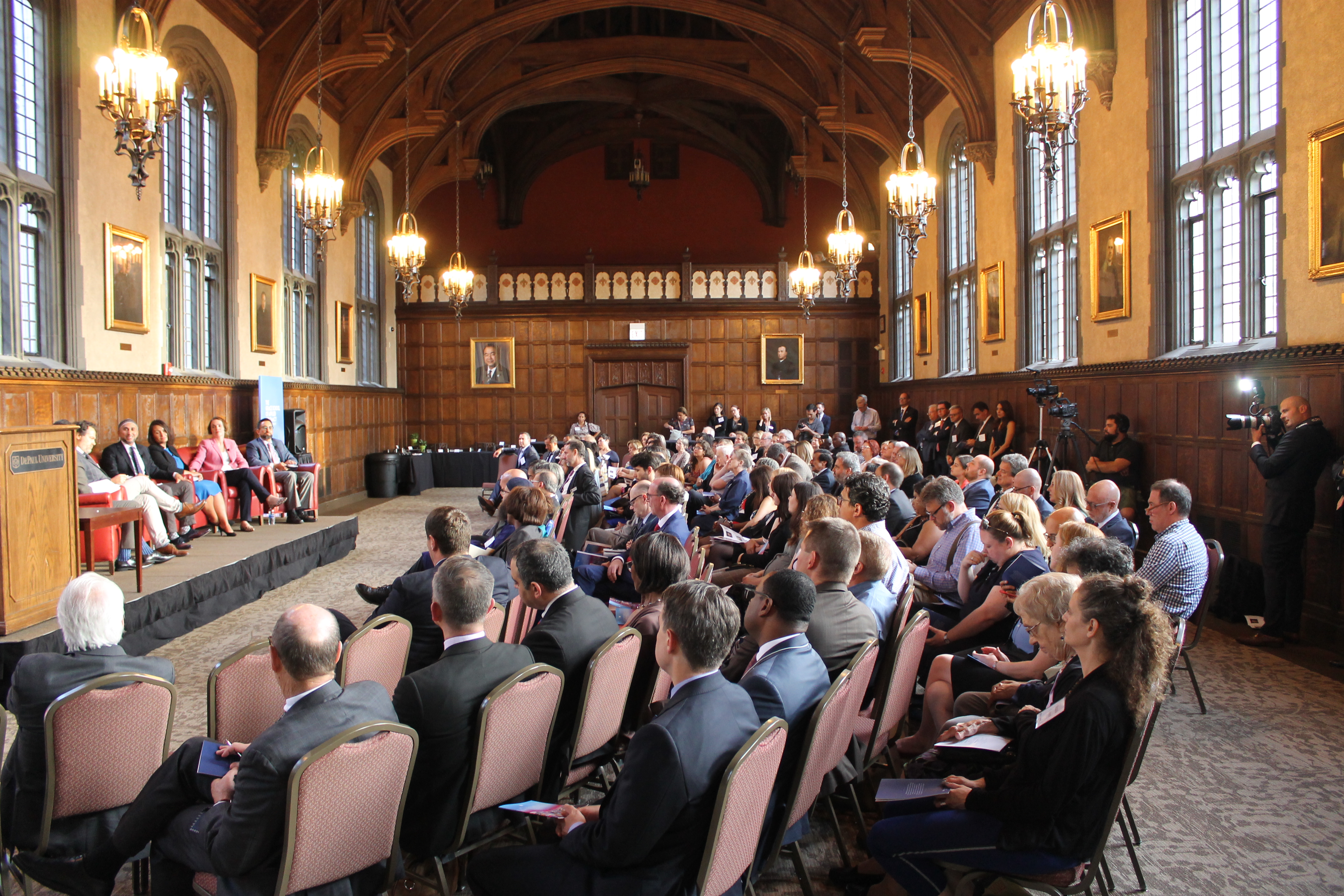
The audience looks upon the speakers at the ceremony. Photo by Christopher Silber, 14 East.
What is the outlook for The Grace School of Applied Diplomacy as it enters its first year at DePaul? Wellman said he was not certain what the enrollment numbers will look like right now.
“The truth of [the size of enrollment] is going to be borne out in the coming months and years,” he said.
The Grace School will offer the only program that focuses specifically on diplomacy in the Chicago area. Wellman said that he believes this program can not only attract current DePaul students to study diplomacy, but can bring new people to the university to study in the school.
“We’re starting out with such an incredible launch, I think that we stand a good chance of bringing a lot of people to DePaul that might not otherwise have come because they’re attracted to this program,” he said. “So I don’t think this program is going to be taking students away from other departments as much as it’s actually going to be bringing students to the school and other departments.”
The possibility of attracting new students to DePaul could prove beneficial to the College of Liberal Arts & Social Sciences and the university as a whole. LAS has endured an undergraduate enrollment loss of 432 students, or 16 percent, from 2014 to 2018. The University’s undergraduate enrollment dropped by about 10 percent in the same timeframe.
While much remains to be done during the inaugural year of The Grace School — endowed positions to be filled, students to be recruited and a large gift to be used according to its stipulations — one thing is certain: once the location of the school’s offices is announced, administrators hope that people from all over the university will be walking in.
Header image by Christopher Silber, 14 East.


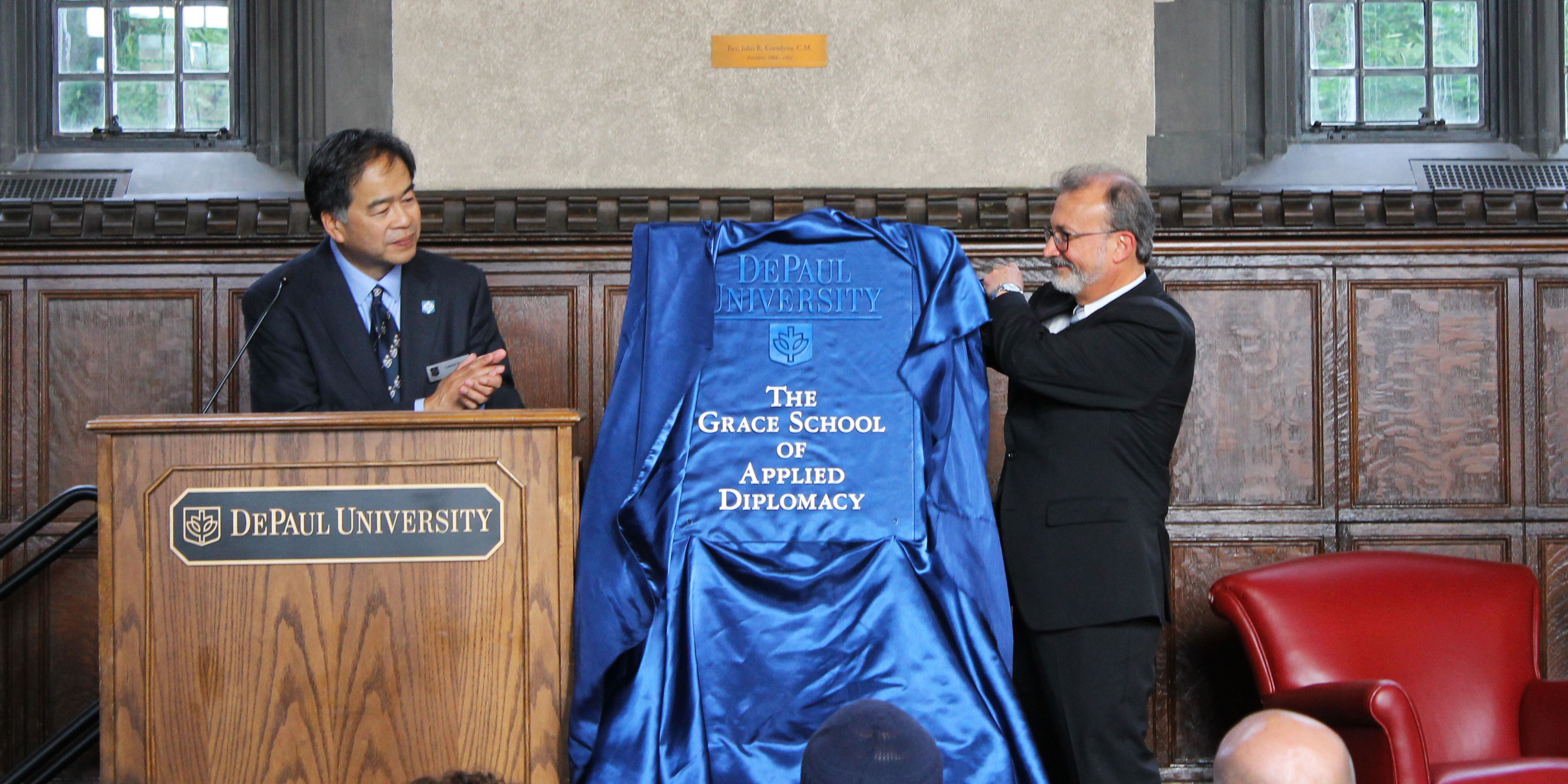

NO COMMENT